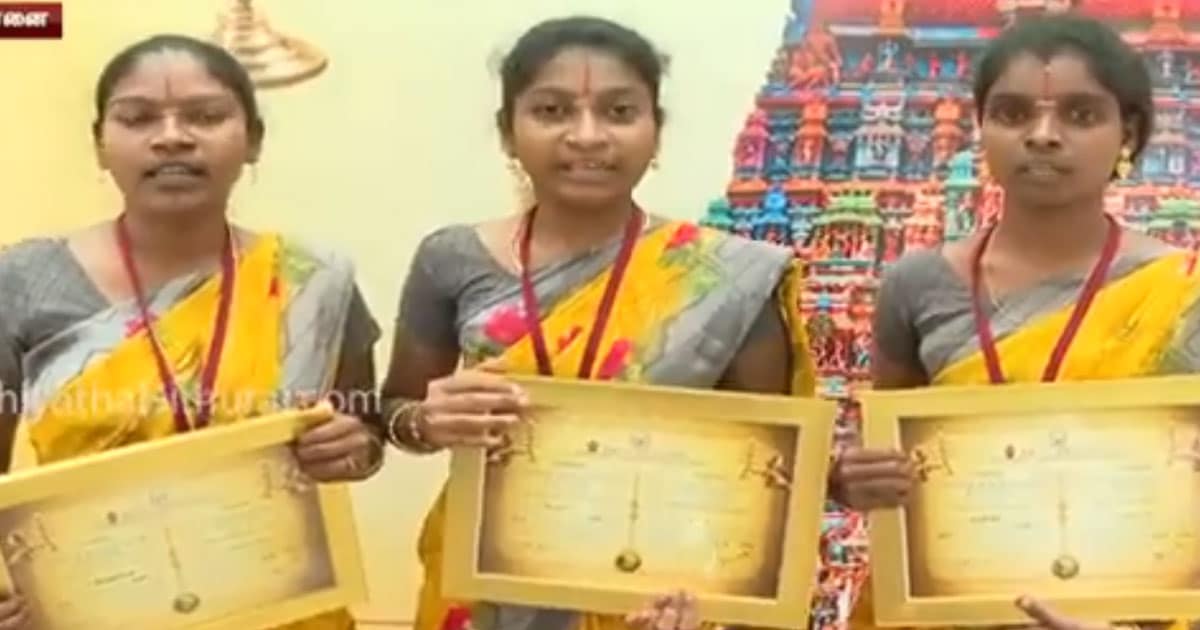In a groundbreaking development that defies centuries-old patriarchal norms, three young women from Tamil Nadu, Krishnaveni, S Ramya, and N Ranjitha, have etched their names in history by completing their training to become priests. Their achievement marks a significant departure from the long-standing tradition of male-only priests in temples across the state.
This transformative change is a testament to the evolving landscape of gender equality and empowerment in India, especially in the realm of religion.

Challenging Tradition
For generations, the role of priests in Tamil Nadu’s temples has been exclusively reserved for men. The idea of women actively participating in religious rituals or assuming priestly duties was considered unconventional, if not outright sacrilegious, by many. However, the winds of change have swept across the state, challenging these entrenched beliefs.
The appointments of Krishnaveni, S Ramya, and N Ranjitha as assistant priests will be made at temples under the supervision of the Hindu Religious and Charitable Endowments Department, which operates under the state government. This move signals the government’s commitment to inclusivity and gender equality in the realm of religious practices.
Training for a New Era
During their training at the Archakar Training School, which is run by the Sri Ranganathar Temple in Srirangam, these women learned the intricate art of performing poojas, chanting mantras, and conducting various religious rituals. These skills are essential for the role of a priest and have traditionally been handed down from one generation of male priests to another.
The fact that Krishnaveni, S Ramya, and N Ranjitha embraced this rigorous training with dedication and determination underscores their commitment to breaking gender barriers in the religious domain. Their journey was undoubtedly challenging, but they persevered, driven by the desire to pave the way for other aspiring women who share their dreams.
Voices of Empowerment
The three women priests have become beacons of hope for countless others who aspire to follow in their footsteps. Ramya, who holds an MSc degree from Cuddalore, shared her initial challenges during the training and expressed her gratitude to their teacher, Sundar Bhattar, for his exceptional guidance. She noted, “Though it was difficult, we didn’t want to give up. We want to thank everyone for their support.“
Krishnaveni envisions a future where she can serve as a permanent priest in temples after completing her practical training period.
Her commitment to God and the people is unwavering, and she articulates her purpose by saying, “That’s the reason why I chose to do this.” Her words reflect her journey and the collective aspirations of women who seek to break free from the shackles of tradition.
A Catalyst for Change
Including women as priests in Tamil Nadu’s temples represents a broader societal shift towards gender equality and empowerment. It challenges deeply entrenched gender biases and stereotypes that have persisted for generations. Acknowledging women’s spiritual capabilities and aspirations reaffirms that devotion and religious service know no gender boundaries.
The success of Krishnaveni, S Ramya, and N Ranjitha demonstrates that change is possible, even in traditionally conservative domains. It also sends a powerful message to society at large that progress is achieved when women are allowed to participate fully in all aspects of life, including religion.
The remarkable journey of Krishnaveni, S Ramya, and N Ranjitha serves as a beacon of hope and inspiration for women not only in Tamil Nadu but across India and beyond.
Their pursuit of a priestly vocation challenges deeply rooted patriarchal traditions and signifies a historic shift towards greater gender inclusivity in religious practices. As these three women prepare to take on their roles as assistant priests, they carry with them the hopes and dreams of countless others who aspire to break free from the constraints of tradition and realize their full spiritual potential.
This transformation underscores the broader societal shift towards gender equality, reminding us that women can break down even the most formidable barriers when they are empowered to follow their passions and dreams. Krishnaveni, S Ramya, and N Ranjitha are not just priests; they are pioneers of change, lighting the path for a more inclusive and equal future in the world of religion.



